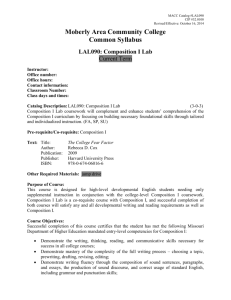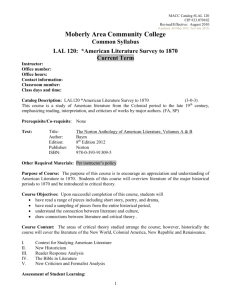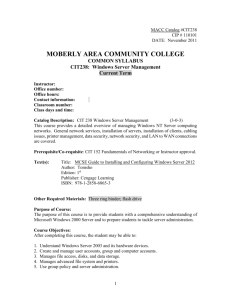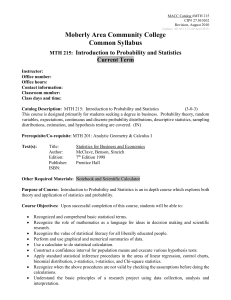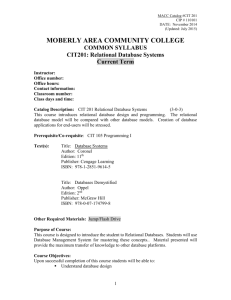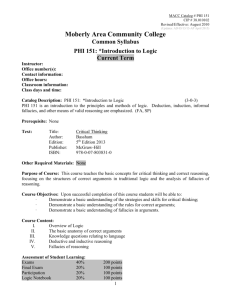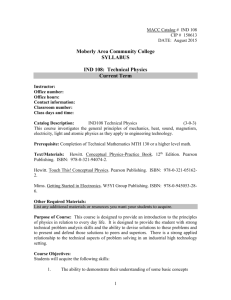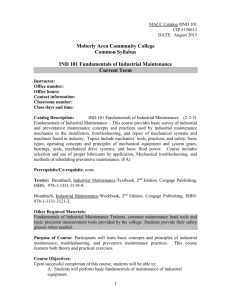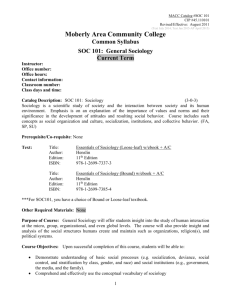MUS 105 Music of America - Moberly Area Community College
advertisement
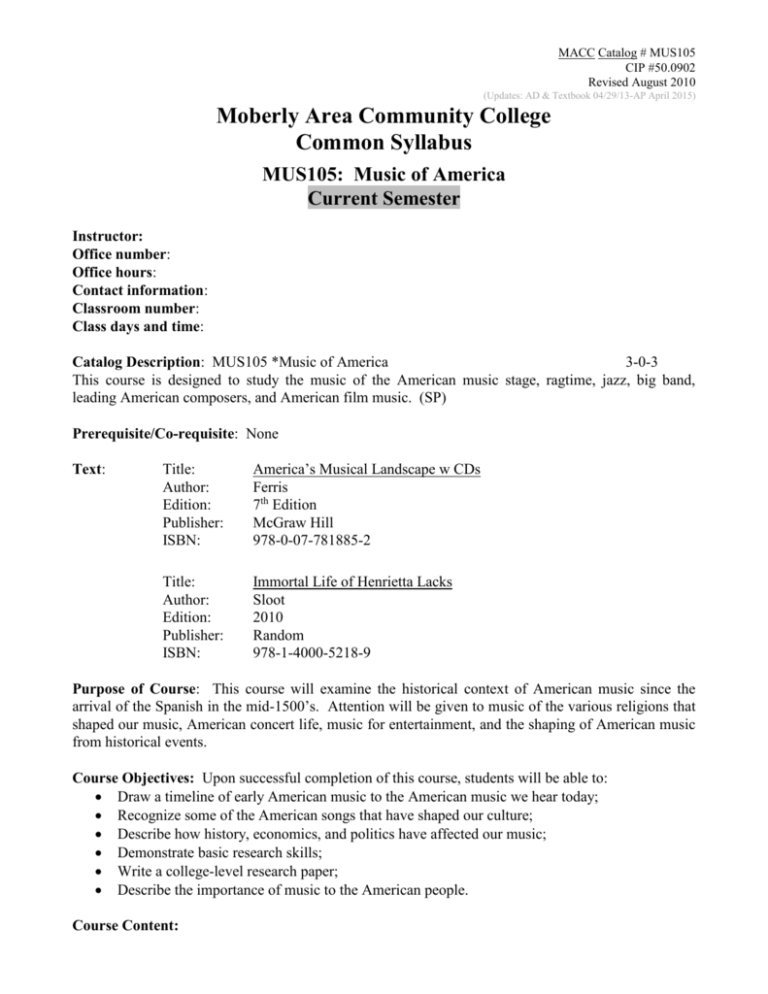
MACC Catalog # MUS105 CIP #50.0902 Revised August 2010 (Updates: AD & Textbook 04/29/13-AP April 2015) Moberly Area Community College Common Syllabus MUS105: Music of America Current Semester Instructor: Office number: Office hours: Contact information: Classroom number: Class days and time: Catalog Description: MUS105 *Music of America 3-0-3 This course is designed to study the music of the American music stage, ragtime, jazz, big band, leading American composers, and American film music. (SP) Prerequisite/Co-requisite: None Text: Title: Author: Edition: Publisher: ISBN: America’s Musical Landscape w CDs Ferris 7th Edition McGraw Hill 978-0-07-781885-2 Title: Author: Edition: Publisher: ISBN: Immortal Life of Henrietta Lacks Sloot 2010 Random 978-1-4000-5218-9 Purpose of Course: This course will examine the historical context of American music since the arrival of the Spanish in the mid-1500’s. Attention will be given to music of the various religions that shaped our music, American concert life, music for entertainment, and the shaping of American music from historical events. Course Objectives: Upon successful completion of this course, students will be able to: Draw a timeline of early American music to the American music we hear today; Recognize some of the American songs that have shaped our culture; Describe how history, economics, and politics have affected our music; Demonstrate basic research skills; Write a college-level research paper; Describe the importance of music to the American people. Course Content: MACC Catalog # MUS105 CIP #50.0902 Revised August 2010 (Updates: AD & Textbook 04/29/13-AP April 2015) Prelude – Basic Properties of Musical Sound I. Part I Music in Early North America a. North American Indian Music b. Folk Music c. Religious Music in the Colonial, Revolutionary, and Federal Periods d. Secular Music in the Colonial, Revolutionary, and Federal Periods II. Part II The Tumultuous Nineteenth Century a. Religious Music in the Early Nineteenth Century b. Popular Music of the Civil War Era c. Early Concert Music d. American Concert Music Come of Age: The Late 19th Century III. Part III The Growth of Vernacular Traditions a. The Rise of Popular Culture b. Country Music c. Ethnic Traditions and the Urban Folk Revival d. The Jazz Age e. Jazz 1930-1960 f. Jazz since 1960 IV. Part IV A Diversity of Popular Music a. Latin Popular Music b. Rock and Roll c. Popular Music sine 1970 V. Part V Music for Theater and Film a. Musical Theater b. Music for Films c. American Opera VI. Part VI Tradition and Innovation in Concert Music a. Experimental Music Revolution b. Early 20th Century Mainstream Concert Music c. The Avant-Garde d. The Recent Mainstream Assessment of Student Learning: EXAMS: (300 points) ESSAYS: (300 points) The following percentage scale will determine the final grade: 90%-100%=A 80%-89%=B 70%-79%=C 60%-69%=D 50% 50% Description of Major Assignments (s)/Projects (s): Essays: The student will write three essays 2-3 pages long. Each essay must include three outside sources and the textbook may count as a fourth source. Statement to Connect Course with General Education Outcomes: In compliance with MACC’s MACC Catalog # MUS105 CIP #50.0902 Revised August 2010 (Updates: AD & Textbook 04/29/13-AP April 2015) General Education outcomes, the student who successfully completes this course will be able to: Demonstrate effective written and oral communication skills; Develop a continuing appreciation for artifacts in language , art music, or philosophy and be able to evaluate those artifacts as representations of form, cultural context, and individual expression: and Demonstrate knowledge of how history has shaped society and culture, understand how the individual relates to society and culture, appreciate cultural diversity, understand human behavior and mental processes, and understand human development. Instructor Policies: Academic Dishonesty: MACC board policy is as follows: “Academic dishonesty by students damages institutional credibility and unfairly jeopardizes honest students; therefore, it will not be tolerated in any form.” Forms of academic dishonesty include but are not limited to the following: violations of copyright law, plagiarism, fabrication, cheating, collusion, and other academic misconduct. Incidents of dishonesty regarding assignments, examinations, classroom/laboratory activities, and/or the submission of misleading or false information to the College will be treated seriously. The procedure for handling academic dishonesty is outlined in the Student Handbook (Policy Handbook M.010). In cases of alleged academic dishonesty, the burden of proof is on the student, not on the instructor. Attendance Policy: Any student who misses two consecutive weeks of class during a regular sixteenweek semester or the equivalent proportion of class time during a shorter session will be dropped from the class by the instructor unless acceptable justification is supplied. An instructor must complete and file the appropriate forms to drop the student within one week following the student’s violation of the attendance policy. Additionally, any student who misses more than one-fourth of the entire number of in-seat class meetings in a regular 16-week semester or the equivalent proportion of class time during a shorter session, may be dropped from that class by the instructor if, in the opinion of the instructor, the student does not have reasonable opportunity to succeed in the class. A student’s attendance rate will be calculated based upon the first day of the semester (not the student’s date of enrollment in the course.) Student attendance must be defined in a different manner for online, hybrid, and virtual courses. Student attendance in these courses is defined as active participation in the course. Online, hybrid, and virtual courses will, at a minimum, have weekly mechanisms for student participation, such as any or all of the following methods: a. Completion of quizzes or exams b. Submission of assignments c. Participation in threaded discussions d. Communication with the instructor A student who does not participate in an online, hybrid, or virtual course for two consecutive weeks will be dropped by the instructor unless acceptable justification is supplied. An instructor must complete and file the appropriate forms to drop the student within one week following the student’s violation of the attendance policy. As with ground courses, a student’s attendance rate in online courses will also be calculated based upon the first day of the semester. If a student does not MACC Catalog # MUS105 CIP #50.0902 Revised August 2010 (Updates: AD & Textbook 04/29/13-AP April 2015) demonstrate active participation in the online course within the first two weeks (or the equivalent proportion of class time during a short session), the student will be dropped as “never attended.” Simply logging into an online class does not constitute active participation. Students should be aware that their dropping a course and their last date of attendance in the course may impact their financial aid. (Policy Handbook I.090 and M.095) Tardiness: Per instructor’s policy Make-up and late work: Per instructor’s policy Extra-credit work: Per instructor’s policy Schedule of Student Assignment/Activities: Per instructor’s policy ADA Statement: Students who have disabilities that qualify under the Americans with Disabilities Act may register for assistance through the Office of Access and ADA Services. Students are invited to contact the Access Office to confidentially discuss disability information, academic accommodations, appropriate documentation and procedures. For more information, please call either the Moberly office at (660) 263-4100 x 11240 or the Columbia office at (573) 234-1067 x 12120, or visit our web page at http://www.macc.edu/index.php/services/access-office. Title IX Statement: MACC maintains a strict policy prohibiting sexual misconduct in any form, including sexual harassment, sexual discrimination, and sexual violence. All MACC employees, including faculty members, are considered mandated reporters of sexual misconduct and as such are expected to contact the Title IX Coordinator when they become aware, in conversation or in writing, of an incident of sexual misconduct. For more information on this policy or to learn about support resources, please see http://www.macc.edu/sexual-misconduct-policy or contact Dr. Jackie Fischer, MACC’s Title IX Coordinator, at 660-263-4110, ext. 11236 or jackief@macc.edu.



